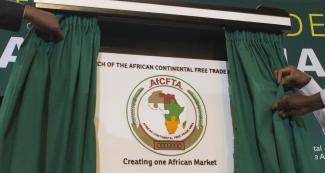Regional integration
Erosion of multilateralism
 Gabriel Dusabe/picture-alliance/Xinhua
Gabriel Dusabe/picture-alliance/Xinhua
During World War II, mutually gratifying trade and economic cooperation were recognised as preconditions for peace and prosperity. People realised that the wave of retaliatory and discriminatory protectionism in the 1920s and 1930s had facilitated the rise of Hitler’s Nazis in Germany. Protectionism that was supposed to protect countries from economic decline during the great depression actually led even deeper into the crisis.
In view of the devastation, policymakers wanted to prevent similar scenarios in the future. Western countries embarked on close economic cooperation. Apart from the World Bank and the International Monetary Fund, the General Agreement on Tariffs and Trade (GATT) was established. Five decades later, it gave rise to the World Trade Organization (WTO). From the start, the multilateral trade rules included free trade, reciprocity and non-discrimination. Free trade implies no restrictions on the movement of goods and services; reciprocity entails country B reducing a barrier to trade when country A reduces a trade barrier; and non-discrimination implies applying the same trade rules to everyone.
Presently, there is a growing disenchantment with globalisation and trade. Countries are imposing more tariffs in the name of safeguarding employment and protecting domestic industries from what they call “unfair” competition. In 2018, the WTO Trade Monitoring Report reveals that 137 new trade-restrictive measures had been applied by WTO members between October 2017 and October 2018.
WTO Members are not employing WTO instruments to address various trade concerns. This trend is eroding years of significant tariff reductions and cordial mediation of trade disputes between countries. From an African perspective, it is worrying. After all, the multilateral system was designed to promote peace and prosperity – and it did prove useful in both regards. Against the global trend of disintegration, African governments are moving forward towards creating a continental free-trade area (see main story). (ks/mp)